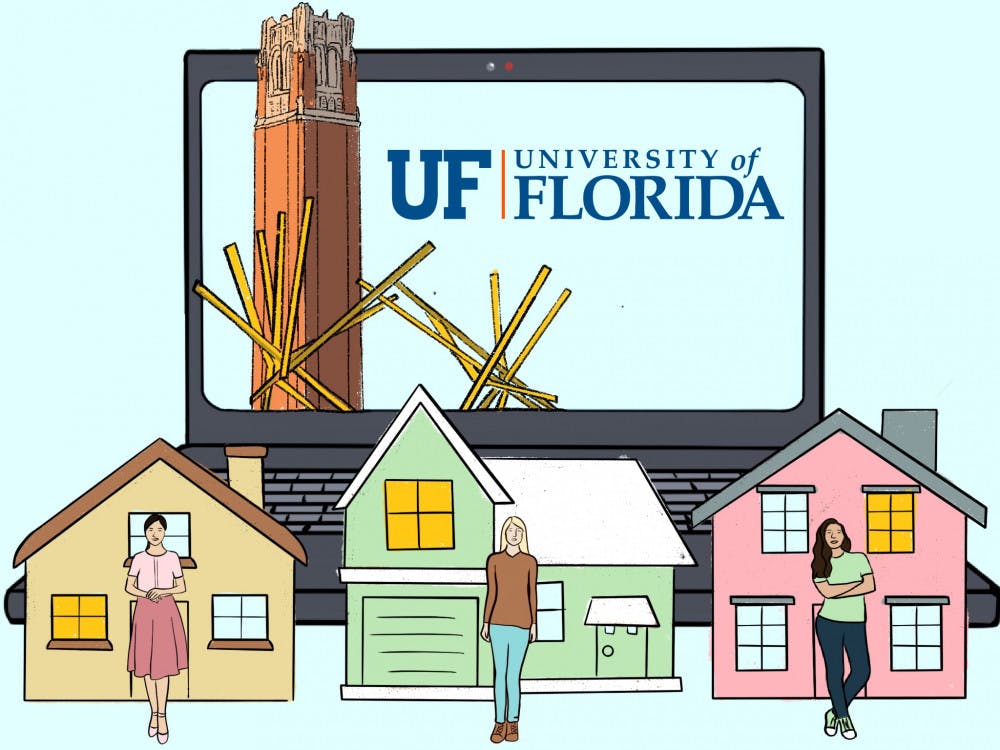Cristina Negraru chose to live within walking distance from the Ben Hill Griffin Stadium because she was hoping to attend football games. More than a month into her first semester, she doesn’t see that happening.
“I didn't want to come to UF to just sit in my dorm and do my classes all day and rotate between here and the library,” she said.
Originally from Dallas, Negraru, an 18-year-old UF math freshman, is one of about 6,500 students admitted into UF for Fall. Due to COVID-19, she and other freshmen had unconventional high school endings, with graduation and prom being cancelled in-person. Now, college is challenging them once again, socially and academically.
All of her classes moved online, but she still decided to live on campus to adapt to college more easily by meeting students at UF, which she said has only happened within her dorm.
Other than her roommates and dormmates, Negraru said she doesn’t have many friends. It feels strange because she has never had issues making friends and considers herself to be a social person, she said.
“It's a lot harder to meet people with having classes online,” she said. “I'm not going to, like, I don't know, text someone on Zoom and ask them if they want to be friends.”
Originally from Hollywood, Florida, Robert Skrzypek’s family decided to move to Connecticut to stay safe amid the COVID-19 pandemic.
Skrzypek, a 19-year-old UF economics freshman, had a plan until about mid-summer to live in Gainesville at Infinity Hall, a UF dorm. However, when UF announced most classes were going to be taught online, he decided it was better to stay home with his family in Connecticut.
“My parents are a little older,” Skrzypek said. “If I went to UF, and UF closed and I had to come home, and I could potentially have COVID, it would be dangerous for them as well.”
Skrzypek did not want to set high expectations for this semester because he knew it’d be hard to meet them, he said. He is taking five courses online, including microeconomics and a geology class. His professors have been understanding, he said, but interacting through a screen makes it difficult to stay engaged.
“It shortens your attention span because you don't have that same engagement,” Skrzypek said. “You don't have classmates around. You don't have people asking questions.”
Although Skrzypek has not fallen behind, he constantly feels like he is.
“I always am thinking 'Did I miss something? Am I forgetting if something is due?’ And that's made me a lot more anxious,” Skrzypek said. “It doesn't really feel like you're getting an education as much as you're just completing assignments.”
Skrzypek keeps a piece of paper and a pen to write down organizations, events and activities that interest him as he comes across them. He said that at times, it feels overwhelming going on social media and seeing UF-related programs and organizations people can apply to.
Before the pandemic hit, Skrzypek was looking forward to meeting new people and joining a biking club at UF. Remotely, he is now working on getting involved with organizations related to economics and political sciences.
“You see all these things — all these ‘Don't forget to do this,’ or ‘Sign up for this,’ or ‘This is a club that's available,’ Skrzypek said, “but the application is due tomorrow, and it's been open for two weeks. ‘Sorry, you didn't know about it.’”
Isabelle Ryan, a 17-year-old UF art freshman, learned a couple weeks ago that her roommate on the first floor of Jennings Hall had tested positive for COVID-19.
Ryan ended up spending three days in Riker Hall, an on-campus hall designated for students who’ve come into close contact with someone who’s tested positive. She criticized the system UF put in place, citing unsafe communal bathrooms and prepared meals that would sit on hall countertops for three hours before she picked them up.
“It’s not exactly the best dining experience,” she said.
Things haven’t been all bad, though. She remembers the day she met up with people from her online art class for the first time. The group of eight gathered outside the Reitz Union with masks on and eventually went inside and ate lunch together.
“It was really nice to get to meet people within the first month of school,” she said.
If she didn’t make the effort to reach out to others, she’d just be alone in her room all semester, she said. She encouraged people to try to not get too caught up in the things they can’t control.
“There’s a lot of strength and value in reaching out to people and asking for help,” she said.

Aurora Martínez is a journalism senior and the digital managing editor for The Alligator. When life gives her a break, she loves doing jigsaw puzzles, reading Modern Love stories and spending quality time with friends.






